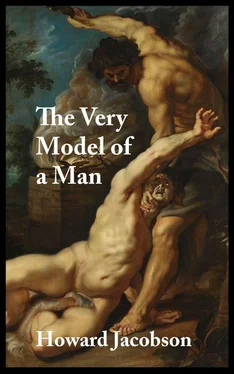None the less, what Moses asked for was not unprecedented. The earth had opened its mouth once before. And that was…
*
The pleats in Sisobk the Scryer’s neck unrumple like a squeeze-box. His head snaps back. Precognition has about-turned without ceremony and lurched in the direction of pre-occurrence.
He has no more stomach for digesting the past than he has neck for discovering what’s behind him, but sometimes it rears on all sides like a mountainous wave, swamping the bobbing future. Or opens like the earth…
And that was…
And that was…
… to receive the blood of Abel, beloved only brother and companion of Cain.
It is only when he has finished reading Preplen’s letter that Cain recognises someone has been standing at his shoulder, reading with him.
He turns his head and is not irrecoverably vexed to see that it is Naaman’s daughter, Zilpah, the plaited girl, bearing his jeroboam of wine, handmaiden fashion, on what would have been her hip had she had one.
He notices that she is raw-eyed, that her lashes are wet at the very tips, as though she has dipped them infinitesimally, like two bathing birds, in emotion.
‘You should not read in the dark,’ he tells her.
It is open to her to say something simple, such as, ‘I know I should not’ or ‘In truth I did not’; but she is drawn to deviousness. ‘I followed the characters,’ is what she decides to say, ‘but I did not make out their meaning.’
‘Then why are you distressed?’
‘You suppose me to be distressed on your behalf?’
He only stares at her.
‘By a private letter?’
‘So, you made out it was private?’
She adjusts, steadies the jeroboam of wine. ‘You can tell when writing is sad,’ she says, ‘just by the marks on the parchment.’
He pushes at the door of the rest room, gesturing her to go inside and take the weight of the wine off herself. Directly the door closes on them he can smell her. Neither sweet nor sour; neither fresh nor stale; but ticklish on the nose… peppery.
‘It wasn’t sad,’ he tells her. ‘It was imbecilic.’
‘Then it’s sad that something imbecilic should have such a powerful effect on you.’
He wants to say it hasn’t, but he knows that she is bound to find that even sadder. And he isn’t sure anyway how Preplen’s words have affected him.
He falls vacant, wondering what she has read and what she hasn’t; what she will have made of the poet’s needling dissection of his faint heart, his apostasy (for that was the charge, wasn’t it? — disloyalty, defection); whether Preplen’s rant against Babel will have offended her as a citizen; whether the vomit and the farts will have scandalised her as a woman.
A woman. The word is invariably grotesque to him now — overblown, foolish, laughable. Except that he doesn’t laugh. Woman. It sits like a stone on his tongue. Woman. Too much was demanded of the word from the very beginning. Too much was invested in it by his father… she shall be called Woman. Too much was feared from it by Yahweh. And too much was expected of it by him. Poor Eve! It wasn’t her fault. No one — no woman — could have lived up to that fanfare of pre-publicity.
There are other words that adequately meet Cain’s experience. Wife, daughter, nurse, girl, widow, hag. He has no need of woman.
Naaman’s daughter, the girl Zilpah, pours him wine, wiping the goblet before handing it to him. Maidservant.
They sit opposite each other, in low gossip chairs. Or rather, he sits and she floats — a cushion of ecstatic temerity, bold fear of him and bold fear for him, keeping her a quivering hair’s breadth above the rattan.
‘So,’ he says, ‘do you think I am unnecessarily sensitive about my horns?’
She drops a fine film between them, a watery mist, like sea-spray. Behind this she shakes her head and enacts a hurt incomprehension.
He flaps the air with the letter which he still holds, folded, in his right hand.
‘I told you,’ she says, ‘I did not read it.’
‘Ah yes,’ he says, ‘you only saw the sadness of the characters.’
A flinch from her. A misty tremor that lightly sprinkles him.
‘But you would like to feel the place, anyway,’ he goes on, ‘from which I proliferate my ivory? You would like to finger the bumps? Perhaps you will be able to read them, at least. I’m told the science of phrenology is far advanced in Babel.’
She closes her eyes. Shuts her sight down, the way he has seen another Shinarite man-pleaser do.
‘You are not as strange to us as you fear,’ she says, not looking at him, ‘or as you hope. We are used to foreigners.’
‘With tails?’
‘They all have stories.’
‘I said tails.’
She has a tail of her own, a plaited pendulum which counts the beats of her humourlessness against her spine.
‘Your only oddity,’ she says, ‘is in your thinking you’re an oddity.’
‘You would do well telling that to the unicorn.’
‘It’s too late for the unicorn.’
She dares him. She opens her eyes and dares him. Go on, go on — say, ‘It’s too late for me, too.’
He wants to co-operate. Every instinct in his body is civil. If he thought he could see comedy in her, contempt in her, cruelty in her, he would set no bounds to his preposterousness. ‘Me, too. For me, too, it is too late.’ But the only greed he can find in her face is the greed for commiseration. It’s his dying fall she is after, and that she can’t have. A letter from a mad poet, the marks of God’s disfavour on one’s brow — these belong to one order of secrecy and good taste; but a dying fall is in another category altogether.
‘You are not drinking wine?’ he inquires, belatedly.
She waves the offer away, with her hand and with her plait. ‘I never drink,’ she says.
‘Even though the wine in Babel is so good?’
‘I didn’t know it was.’
He nods, raises his goblet like a torch, toasts her, toasts the unicorn.
‘I’m glad you find something to admire in our city,’ she says.
‘I find many things.’
‘We wouldn’t guess that from what you say about us.’
‘It isn’t what one says.’
‘What, then? What one does? By every account all you are doing is planning to build your own city somewhere else.’
‘I could hardly plan to build it here.’
‘So it is true?’
‘About the city, no. I intend — that’s too grand a verb — I think, only of a tower.’
‘A temple?’
‘Just a tower.’
‘As a memorial to your brother?’
She has moved closer to him. He can distinguish the smell of her hair from the rest of her, and it reminds him of the smell of Abel’s scalp, when Abel was more fragile than an egg, a veined transparent oval of warm blood and sour milk — a new thing.
She notices a dark flicker in his eyes, like the memory of grief, or worse, the memory of the memory of grief. Sadden me, her own eyes plead. Sadden me until I cannot bear it.
‘As a memorial to myself,’ he says.
‘You are a vain man?’
He shrugs. ‘No more than the common. But I must have somewhere to be buried.’
She is not sure that she follows. ‘Why would you choose to be buried in a tower? In the hope that your soul will ascend more quickly to a god?’
‘I am not thinking of my soul. I care only about my body.’
‘You wish to be conspicuous in death?’
‘No. Merely comfortable.’
‘And the earth will not do for that?’
Very well, he decides, you have worked hard enough for this — I will sadden you. He takes a sip of wine, religiously, showing her a spotless hand; then draws a spotless sleeve across his mouth. He is a paid performer: he knows how startling the effect is, of fine linen on an ancient face.
Читать дальше











